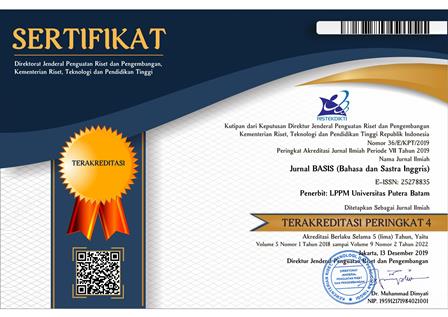INVESTIGATING EFL HIGH SCHOOL STUDENTS' METACOGNITIVE AWARENESS IN WRITING
DOI:
https://doi.org/10.33884/basisupb.v9i1.5434Keywords:
writing, metacognitive knowledge, metacognitive regulationAbstract
Metacognitive awareness was beneficial when implemented in learning activities, especially in writing skills. This research was conducted to explore students’ metacognitive awareness in writing. The participants were 30 high school students. Metacognitive knowledge and regulation from Brown (1987) and Knospe (2018) were employed to get a report on students’ awareness in writing. Metacognitive knowledge is formed from declarative knowledge, procedural knowledge, and conditional knowledge, all of which consisted of planning, monitoring, and evaluating. A cross-sectional survey method was conducted to investigate the data collected. Questionnaires were used to collect the data, then analyzed partially using descriptive analysis, and reported in tables. The data displays that the declarative knowledge and task were respectively 35.1 % and 17.3%; procedural knowledge was 27.7 %; and, conditional knowledge was at 14.2%. Likewise, the results from Metacognitive regulation reported by senior high school students were planning 14.4%, monitoring 24%, and evaluating 11.1%, all of which are categorized at a low level of understanding. The result showed that high school students demonstrated a low level of metacognitive knowledge and regulation in writing descriptive text.
References
Balta, E. E. (2018). The relationships among writing skills, writing anxiety, and metacognitive awareness. Journal of Education and Learning, 7(3), 233. https://doi.org/10.5539/jel.v7n3p233
Baranova, T., Khalyapina, L., Kobicheva, A., & Tokareva, E. (2019). Evaluation of students’ engagement in integrated learning model in a blended environment. Education Sciences, 9(2). https://doi.org/10.3390/educsci9020138
Brown, A. L. (1987). Metacognition, executive control, self-regulation, and other more mysterious mechanisms. In Metacognition, motivation, and understanding.
Crescenzi, A. (2016). Metacognitive knowledge and metacognitive regulation in time-constrained in information search. CEUR Workshop Proceedings, 1647.
EF EPI EF English Proficiency Index. (2020). www.ef.com/epiwww.efset.org
Farahian, M. (2015). Assessing EFL learners’ writing metacognitive awareness. Journal of Language and Linguistic Studies, 11(2), 39–51.
Fauzan, U., Aulya, S. F., & Noor, W. N. (2020). Writing error analysis in exposition text of the EFL junior high school students. Indonesian Journal of EFL and Linguistics, 5(2), 517–533.
Flavell, J. H. (1979). Metacognition and cognitive monitoring: A new area of cognitive-developmental inquiry. American Psychologist, 34(10). https://doi.org/10.1037/0003-066X.34.10.906
Goctu, R. (2017). Metacognitive strategies in academic writing. Journal of Education in Black Sea Region, 2(2). https://doi.org/10.31578/jebs.v2i2.44
Gunstone, R. F. (2021). The importance of specific science content in the enhancement of metacognition. In The Content Of Science: A Constructivist Approach To Its Teaching And learning (pp. 143–158). Routledge. https://doi.org/10.4324/9781315831558-16
Hong, Y. C., & Ganapathy, M. (2017). To investigate ESL students’ instrumental and integrative motivation towards English language learning in a Chinese school in Penang: Case study. English Language Teaching, 10(9), 17. https://doi.org/10.5539/elt.v10n9p17
Jusmaya, A. (2017). Teachers’ belief and classroom practices toward grammar instruction in the communicative language teaching. Applied Science and Technology, 1(1), 184–192. http://www.estech.org
Knospe, Y. (2018). Metacognitive knowledge about writing in a foreign language: A case study. In Metacognition in language learning and teaching (pp. 121–138). Routledge.
Lavrakas, P. (2013). Cross-sectional survey design. In Encyclopedia of Survey Research Methods. https://doi.org/10.4135/9781412963947.n120
Linuwih, E. R., & Winardi, Y. K. (2020). Improving students’ writing skill using a mobile learning application. JURNAL BASIS, 7(2), 281–290. https://doi.org/10.33884/basisupb.v7i2.2433
Luo, J.-J. (2019). A case study on a passive Taiwanese university student’s metacognition changes in the process of English academic reading. Journal of Educational Practice and Research, 32(2), 81–116. https://www.proquest.com/scholarly-journals/case-study-on-passive-taiwanese-university/docview/2343014811/se-2?accountid=210495
Maftoon, P., Birjandi, P., & Farahian, M. (2014). Investigating Iranian EFL learners’ writing metacognitive awareness. International Journal of Research Studies in Education, 3(5). https://doi.org/10.5861/ijrse.2014.896
Mbato, C. L. (2013). Facilitating EFL learners’ self-regulation in reading : Implementing a metacognitive approach in an Indonesian higher education context.
Mbato, C. L., & Cendra, A. (2019). EFL undergraduate students’ self-regulation in thesis writing: help-seeking and motivation-regulation. JELE (Journal of English Language and Education), 5(1), 66–82. https://doi.org/10.26486/jele.v5i1.949
Mohamad, H., Hanafi, H., & Dako, R. T. (2021). A study on phonological process: A case on Indonesian EFL students’ pronunciations. Trans-Kata: Journal of Language, Literature, Culture, and Education, 1(2), 105–114.
Muhassin, M., Hidayah, R., & ... (2020). Investigating spelling errors among Indonesian EFL secondary school students. English Education …, 13(2), 1–24.
Nasihah, M., & Cahyono, B. (2017). Language learning strategies, motivation, and writing achievement of Indonesian EFL students. Arab World English Journal, 8(1), 250–263. https://doi.org/10.24093/awej/vol8no1.18
Nugroho, A., & Rahmawati, A. (2020). “Let’s write a caption!”: Utilizing Instagram to enhance ESP students’ writing skills. Jurnal Basis, 7(1), 1. https://doi.org/10.33884/basisupb.v7i1.1782
Patahuddin, P., Syawal, S., & Bin-Tahir, S. Z. (2017). Investigating Indonesian EFL learners’ learning and acquiring English vocabulary. International Journal of English Linguistics, 7(4), 128. https://doi.org/10.5539/ijel.v7n4p128
Putri, E. W., Fauzan, U., & Toba, R. (2018). The quality of listening skill of the EFL students. IJELTAL (Indonesian Journal of English Language Teaching and Applied Linguistics), 3(1), 79. https://doi.org/10.21093/ijeltal.v3i1.125
Rahayu, D., Hawi, A., Mardeli, M., & Sofyan, S. (2020). Korelasi antara pengalaman mengajar dengan kompetensi profesional guru PAI di Madrasah Aliyah Negeri 3 Palembang. Jurnal PAI Raden Fatah, 2(2), 183–201. https://doi.org/10.19109/pairf.v2i2.3734
Ramadhanti, D., & Yanda, D. P. (2021). Students’ metacognitive awareness and its impact on writing skill. International Journal of Language Education, 5, 193–206. https://doi.org/10.26858/ijole.v5i3.18978
Rodrigues, M. W., Isotani, S., & Zárate, L. E. (2018). Educational Data Mining: A review of evaluation process in the e-learning. In Telematics and Informatics (Vol. 35, Issue 6). https://doi.org/10.1016/j.tele.2018.04.015
Stephanou, G., & Mpiontini, M.-H. (2017). Metacognitive knowledge and metacognitive regulation in self-regulatory learning style, and in its effects on performance expectation and subsequent performance across diverse school subjects. Psychology, 08(12), 1941–1975. https://doi.org/10.4236/psych.2017.812125
Teng, F. (2020). The role of metacognitive knowledge and regulation in mediating university EFL learners’ writing performance. Innovation in Language Learning and Teaching, 14(5), 436–450. https://doi.org/10.1080/17501229.2019.1615493
Teng, M. F. (2021). Effects of individual and group metacognitive prompts on tertiary-level students’ metacognitive awareness and writing outcomes. Asia-Pacific Education Researcher, 1–12. https://doi.org/10.1007/s40299-021-00611-8
Wijaya, K. F., & Mbato, C. L. (2020, October). English education master students’ metacognitive strategies in academic writing. Language and Language Teaching Conference.
Yulianti, S., Nuraeni, S., & Parmawati, A. (2019). Improving students’ writing skill using brains writing strategy. PROJECT (Professional Journal of English Education), 2(5), 714–721. https://doi.org/10.22460/project.v2i5.p714-721
Zheng, L., Cui, P., Li, X., & Huang, R. (2018). Synchronous discussion between assessors and assessees in web-based peer assessment: Impact on writing performance, feedback quality, meta-cognitive awareness, and self-efficacy. Assessment and Evaluation in Higher Education, 43(3). https://doi.org/10.1080/02602938.2017.1370533

















